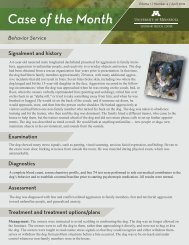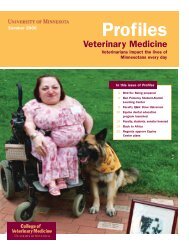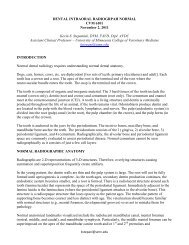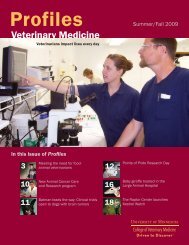Summer/Fall 2013 PDF - University of Minnesota College of ...
Summer/Fall 2013 PDF - University of Minnesota College of ...
Summer/Fall 2013 PDF - University of Minnesota College of ...
Create successful ePaper yourself
Turn your PDF publications into a flip-book with our unique Google optimized e-Paper software.
THE BUSINESS OF VETERINARY MEDICINE<br />
Caribbean veterinary colleges as well as<br />
six international chapters.<br />
Skills learned through participation<br />
in VBMA benefit not only those who<br />
eventually open their own clinics but also<br />
those who join established practices.<br />
“If I were hiring an associate into my<br />
practice, I would want to hire someone<br />
who is aware that there is more to practice<br />
than diagnosing and treating patients—<br />
there’s a lot more to keeping the doors<br />
open than performing surgery,” says Rabe,<br />
who worked in business before enrolling<br />
in vet school. “There is a perception<br />
among practicing veterinarians that many<br />
new graduates want to practice medicine,<br />
but they don’t fully understand that it is<br />
also a business.”<br />
A growing number <strong>of</strong> students, however,<br />
do have a solid handle on what it takes to<br />
run a practice, particularly those who have<br />
earned a national VBMA certificate. These<br />
students have achieved a level <strong>of</strong> business<br />
know-how that puts them one step ahead<br />
<strong>of</strong> their competition.<br />
“A new, s<strong>of</strong>ter economy, increased<br />
price sensitivity among pet owners, and<br />
new alternatives are affecting demand<br />
for veterinary care,” says Dr. David<br />
Lee, hospital director <strong>of</strong> the Veterinary<br />
Medical Center and faculty advisor<br />
for the local VBMA chapter. “At the<br />
same time, decreasing state support<br />
and other factors are increasing tuition<br />
(continued on next page)<br />
STUDENTS AS MENTORS:<br />
VetCamp reaches out to<br />
high school students<br />
Many high school students love animals and say they “always wanted to<br />
be a veterinarian.” But what do veterinarians do What does it take to get<br />
into veterinary school At VetCamp, a <strong>College</strong> <strong>of</strong> Veterinary Medicine<br />
community outreach program, high school students work with <strong>College</strong> <strong>of</strong><br />
Veterinary Medicine students to find out.<br />
VetCamp was initially proposed in 2010 by CVM alumnus Dr. Mike<br />
McMenomy, who was then president <strong>of</strong> the <strong>Minnesota</strong> Veterinary Medical<br />
Association. He brought the idea to Dr. Laura Molgaard, associate dean<br />
for academic and student affairs, who encouraged leaders <strong>of</strong> the Student<br />
Chapter <strong>of</strong> the American Veterinary Medical Association to launch<br />
the project as a community outreach initiative. With funding from the<br />
<strong>Minnesota</strong> Veterinary Medical Foundation, the program was <strong>of</strong>ficially<br />
established.<br />
Veterinary student Colleen Mans supervises as a VetCamp<br />
participant practices suturing up a banana. VetCamp now has<br />
more permanent, reusable suture boards.<br />
Taught by veterinary students, VetCamp is an interactive program for<br />
students in grades 9-12 who are interested in veterinary medicine. The<br />
three-hour program includes hands-on learning activities and games.<br />
Participants take part in a “choose your own adventure” style <strong>of</strong> case<br />
study, where they work to save a fictional pat ient who has arrived at<br />
the veterinary clinic. The students act as veterinarians, using models to<br />
practice real clinical skills. Participants also learn about large and small<br />
animal anatomy, public health and disease control, pet obesity and body<br />
condition scoring, foods and common household products that are toxic to<br />
pets, what it takes to get into veterinary school, and veterinary careers.<br />
The college hosted the first VetCamp in May 2011 for high school students<br />
from Atwater-Cosmos-Grove City High School. Sponsored by the<br />
<strong>Minnesota</strong> Veterinary Medical Foundation, VetCamp now takes place at<br />
various venues throughout the year, including summer day camp activities<br />
at the <strong>College</strong> <strong>of</strong> Veterinary Medicine, inner-city schools, and county fairs<br />
around the state. This year, VetCamp also received generous funding from<br />
Zoetis, a global animal health company.<br />
Veterinary students work with high school students at VetCamp.<br />
To learn about upcoming VetCamps, visit www.cvm.umn.edu/education/<br />
prospective/vetcamp.<br />
Pr<strong>of</strong>iles <strong>Summer</strong>/<strong>Fall</strong> <strong>2013</strong> 23

















